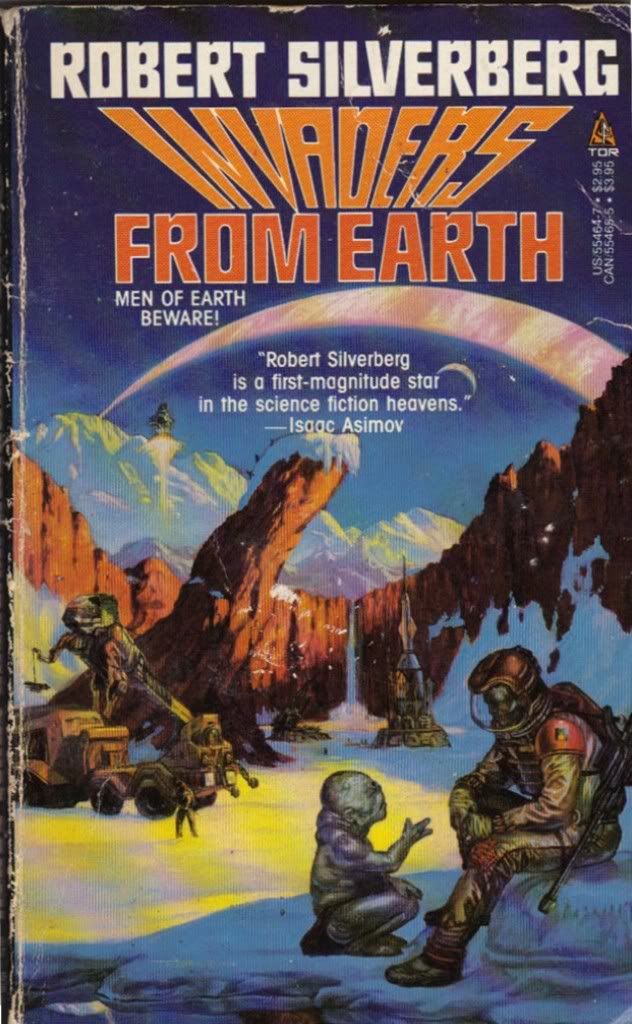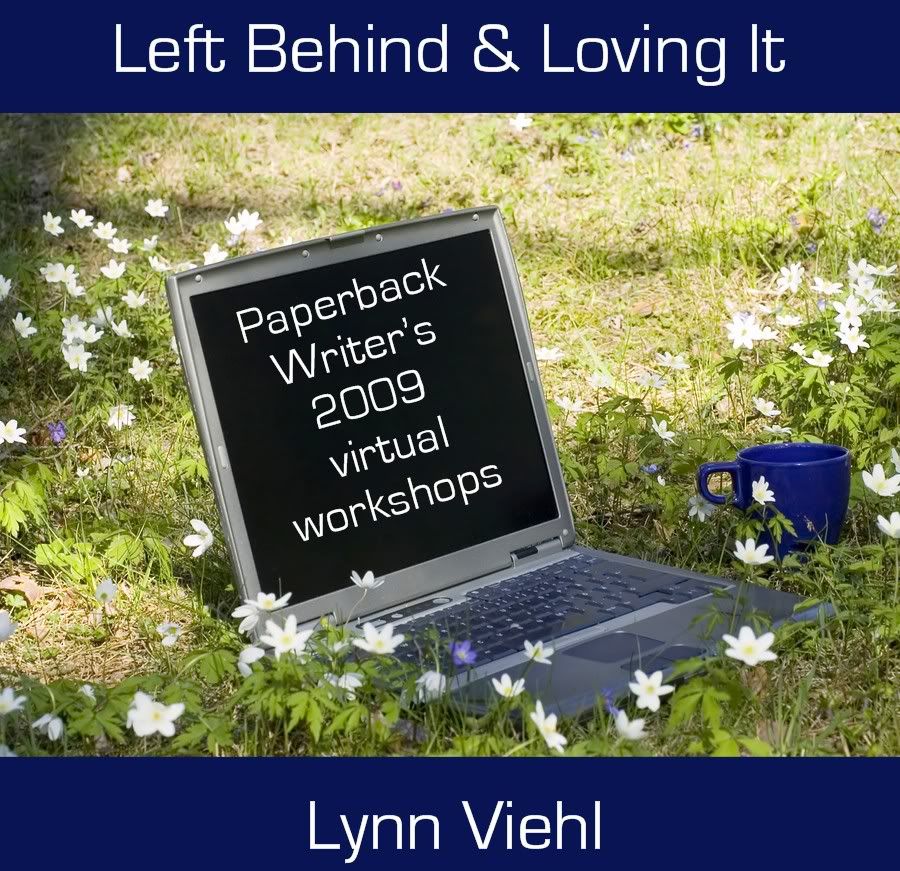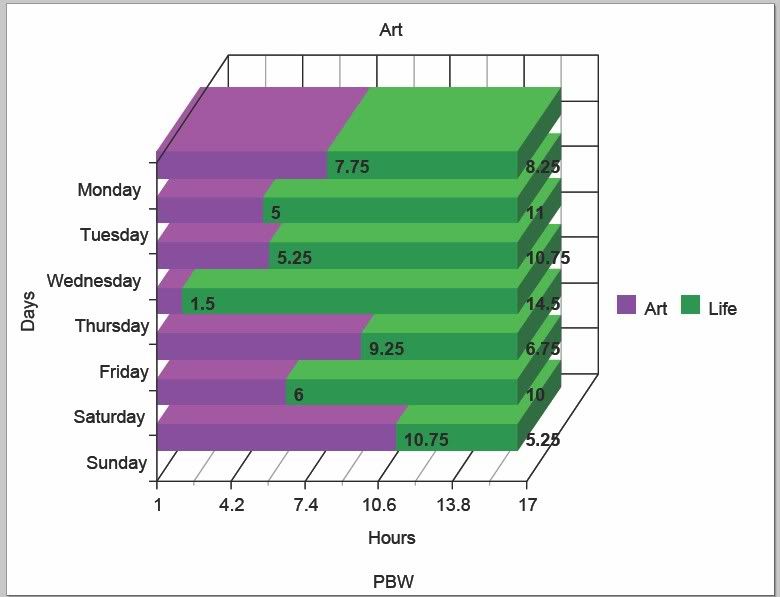The winners of the VW#5 giveaways are:
ArtWish:
Jennifer McKenzieGoodie Bag:
Cora (whose comment began with
Love the analogy. My fairy godmothers don't have names, but I definitely have both of them.)
Winners, when you have a chance, please send your full name and ship-to address to LynnViehl@aol.com, and I'll get your prizes out to you. Thanks to everyone for joining in.
 I. In the Biz
I. In the BizImagine for a moment that you work in the Publishing industry. In this job, your livelihood depends on a couple of things: decent contracts, a healthy advance, fair percentage of sales for royalties, timely payments and building and maintaining a friendly relationship with editors and publishers.
There are also books to be written -- hopefully lots of books. You work hard to sell them, but as far as marketing and publisher support and what is done for any of your books after they're finished, you're completely dependent on the whim of the publisher. You know when you've got great work and, if your luck holds, even a potential bestseller that will generate wonderful sales.
You also have all the worry and stress and hassles involved with delivering a completed manuscript to the editor, seeing it through revisions and doing whatever you have time for to see that it launches successfully. During release week, you hold your breath, cross your fingers and watch for the first lists to see if your book made it to the top of the ranks. If it did, you feel it's all been worthwhile. If it didn't, you feel like a failure, as if you didn't do your job right.
The thing is, in this job, you're not a writer. You're a literary agent, representing dozens of writers, and that book is only one of dozens you'll handle this year.
II. The Marriage of Agent and WriterWhen I was putting together this post I had kind of a rough time organizing it. I guess when I'm dealing with writing topics and exercises and stuff I can make that fit into a logical structure. When you're talking about people, however, it's hard to reduce them to numbered paragraphs and bulleted points. So I hope you all will bear with me as I go through my thoughts and overlook the times when I ramble.
I've always thought agents are a lot like spouses. When things are going well, writers routinely brag about how great their agent is, how happy they are with them, and how lucky they are to have them (and very often they'll speak of their agent the same way even if the agent hasn't done a stellar job for them, because who wants to be seen as having lousy representation?) But when things go seriously wrong, writers blame their agent and bitch endlessly about them, what a huge mistake it was to sign with them, and how much better off they'd be with another one.
A writer who comes to an unhappy split with their agent generally doesn't talk about it publicly, but in private will say plenty to their friends, along the lines of: "I finally got rid of his ass. Yeah, I can't believe I was stupid enough to stay with him all these years, the bastard. Good riddance." We rarely if ever hear how agents talk about writers after they split, but one agent friend of mine assures me that feelings on their side can be just as bitter (they're simply more discreet.)
The effort it takes to acquire a decent agent is often much like looking for a spouse. Once we've signed with our first agent, our expectations are roughly equal to how it will go with our first marriage (minus the sex, of course.) We're thrilled, nervous, terrified and paranoid. We have a lot of unrealistic expectations. We want everything to go perfectly -- and, of course, it generally doesn't.
With any agent, you can do all the checking and rechecking and verifying and obtaining of references and whatnot, but as with marriage you really don't know how the relationship will work until you've had some time together. The thing to remember is that agents gamble on us as much as we do on them, so the stress isn't all on our side. For everything you've ever said or asked or worried about an agent, they've done the same about writers.
III. Dealing with an AgentI don't hold the world's record for sticking with a marriage -- in my youth I collected ex-husbands like other women do Beanie Babies -- but I'm definitely a veteran of the single, monogamous agent-writer relationship. It's a funny relationship, but like most it has its good and bad points, the inevitable highs and lows. Naturally not all agent-writer relationships run the same way, and I will say upfront that everything I state is based on my personal experiences and what I've learned from working with the same agent for the entire length of my professional career, and from friendships with a couple of other agents in the biz.
My agent and I have been working together for almost eleven years now. Sometimes when things are going especially well for me, I think I should celebrate by sending her a gift on the day I signed with her (the traditional gift for this year's anniversary, appropriately enough, is steel.) I don't actually do that, but at regular intervals (usually during the holidays) I try to remind my agent that I do appreciate the work she does on my behalf.
We've also have our problems, and they've also had a long-term effect on our relationship. There have only been three times in the last eleven years that I've considered ending my relationship with my agent. Without getting into the gory details or naming names, after I cooled off, calmed down and looked at the situation objectively I always found a reason to stick with her and weather the storm (not as easy as it sounds; once that took the better part of a year.) Interestingly enough, all three times I nearly split with my agent were over problems instigated by someone outside our relationship, and twice it was the same person.
Anyway, those are the two extremes of the agent-writer relationship, and if you stay with an agent long enough, you'll probably experience both. I can't speak for my agent, but knowing how stubborn, opinionated and control-freakish I am as a client, I can almost guarantee you that she's felt the same way about me. Yet somehow each time these and other, more minor crises come up, we've muddled through them -- not always to my liking or hers, but to a point where we could compromise, get on with it, and continue to work together.
I've been courted by plenty of other agents -- one just tried to romance me last week -- but there is a promise I made to myself and my agent a couple of years ago, during what was probably the worst time in my relationship with my agent. I told her that if for whatever reason she stops being my agent, I would not sign with anyone else; I'd just do it myself. Honestly, I wouldn't want to go through this again with anyone. So I have twice as much reason to make my agent-writer relationship work, because if she goes, I'm flying solo from then on.
IV. Establishing BoundariesI think in general writers regularly expect too much out of their agents, and I'm not sure why this happens. It might be a kind of weird transference that happens when a writer turns pro. You can see this in action whenever many writers get mad at their publisher or something their publisher does. The angry/upset writer hardly ever blames the publisher for the problem. Instead they blame their agent. If agents ran publishing, I'd agree with this, but they don't. They are as much at the mercy of the publisher as we are. We have to maintain a working relationship with our publisher for the sake of our careers. Multiply that by twenty or thirty clients, and you'll understand what the agent also has at stake.
I also think agents regularly expect too much out of their writers as well, chiefly in the crap we're expected to take from publishers and likewise the phony gratitude and ass-kissing department. I know agents overestimate our capacity to stoically withstand and forgive things like an abusive editor, a broken verbal agreement, a botched production and other such "shut up and take it" situations. Expecting us to keep quiet about it is one thing; expecting us to be cheerful and friendly to and only speak well of the people who do this to us year after year is another. For agents it's a business deal, and all they really have at stake is income. For us it's our dream, and when that's shattered, it's very hard to pick up the pieces and behave as if nothing happened.
I don't know how to solve the problems on either side, but I do think from the beginning writers and agents need to establish boundaries in their relationship to keep it workable. Maybe if boundaries were the first thing that agents and writers discussed they might stay together longer.
I've never depended on my agent for emotional support; I like her well enough but I don't consider her a personal friend. I don't consider it necessary to attend any events that she does or be friendly with her friends in the business. I don't ask for her opinion very often, but when I do it's strictly related to contract offers or submissions. I don't invite her to my home or involve her in my family activities. When I'm in New York I don't go to her office or call her (this is mainly so I don't get sucked into going to meet my editors, which for the most part I have successfully avoided for eleven years.)
I do try to stay out of my agent's hair. I don't harass her assistant, or leave nuisance messages, or otherwise waste her or her peoples' time. I don't call her at the office at all unless it's absolutely necessary that we talk (generally about something I don't want to put in writing.) She's given me her mobile number a couple dozen times, but I've never called it unless she's given me specific instructions to do so. We communicate chiefly through e-mail, and while it sounds cold and distant, I think it's a nice buffer for both sides and gives us time to think about things before we respond, which frankly sometimes we both need.
The clear boundaries are really important, I think, because we know where they are and how we can operate inside them. It's not the agent-writer relationship I envisioned as a rookie, but it's the relationship we've worked out over the years. For me it's this or nothing, and that does tend to put things in perspective very fast.
V. The Ying and Yang of the Agent-Writer RelationshipHere is the basic definition of the agent-writer relationship: your agent is your literary representative in the business side of Publishing, and negotiates any business with publishers on your behalf according to your wishes. In return for that representation, you pay your agent a guaranteed percentage of whatever they sell for you for as long as it sells.
The details of what is involved in this relationship vary according to writer and agent, but here are my thoughts on how both should handle certain common areas:
Sales: Your agent should always strive to get you the best possible deal with any publisher and steer you away from bad deals. You should communicate clearly to your agent in advance of any negotiations what you would like to get out of the deal as well as specific points on which you're willing or not willing to compromise on.
Contracts: Your agent should read your contract thoroughly and point out any undesirable terms. You should read every word of your contract to recheck it for any undesirable terms. Your agent should never pressure you into signing a contract that doesn't suit you. You should never sign a contract that doesn't suit you unless you are 100% willing to accept the terms and take full responsibility for agreeing to them.
Goals: Your agent needs to know what you want to do with your career, and should communicate that clearly to your publisher. You need to make those decisions and communicate them clearly to your agent regularly, especially when your goals change.
Personal Life: Ideally your agent should not involve you in their personal life. Likewise, you should not involve them in yours. If you do develop a friendship with your agent, it needs to be one you have outside the agent-writer relationship, and neither of you should bring it into play when having business discussions or making career decisions.
Finances: Your agent must be financial responsible to you and act as your representative when dealing with publishers who owe you money, and if they are paid first they need to send you your portion in a timely manner. You are not your agent's ATM card. You need to keep track of payments you're owed, communicate any delay in payments to your agent, and keep your books up to date. You should also keep your finances in order and not depend on your agent to constantly advance you money they haven't received or otherwise bail you out. Your agent is also not your ATM card.
Contacts: Your agent should never try to pressure you into promoting, blurbing or otherwise assisting another client of theirs. You should never try to use your agent to obtain promotion, blurbs or other assistance from another client of theirs.
Honesty: You and your agent should never lie to one another. If you catch your agent in a lie, or for some reason they confess that they've lied to you, you can no longer trust them with sensitive information. The same goes for you if you lie to them.
Problems: Agents should tell you when for whatever reason they have a serious problem with you. Likewise you should confront them about any serious problems you have with them. It's best if both sides wait to do this when they don't feel like shouting, writing impolitic e-mails, or leaving nasty messages on voice mail. However, if either side expresses anger inappropriately, it's best to confront that and the problem as soon as possible.
VI. Final Thoughts.Your expectations about your agent are your own business, but the more realistic you are, the better equipped you'll be to have a successful relationship. I think one of the most important things to remember is that it is impossible for an agent to rep only one writer (imagine trying to live off 15% of what you currently earn -- that's what one writer represents in income for their agent), so to expect them to focus on you and your books and your career 24/7 is not only ridiculous, it's unfair.
There are some hard facts about agents that you have to accept. An agent's relationship with any publisher, for example, takes priority over their relationship with you. If the agent is forced to choose between you, chances are they are going to side with the publisher (unless you're Stephenie Meyer, in which case Little,Brown is going down.)
Agents learn early on how to talk to writers and say the things we want to hear in order to motivate us. They are by nature salespeople and sell to us as much as to the publishers. It doesn't mean they're insincere -- I believe most agents are basically honest and do care about their clients -- but after you've been with an agent for a time you'll start recognizing their pitches and pep talks. They only have so many of them that they use, and most they recycle, so be nice and don't say anything snide.
You have to be worth an agent's time, which means you have to bring enough to the table to warrant their attention and/or earn enough to make that agent worry about losing you. The most attention you'll get from an agent is at two crucial stages of the game: in the beginning of your career, when as a writer you are most vulnerable professionally, and when any offer comes in (because until you accept the offer, the agent doesn't make any money, and that portion of their income is dependent on your decision.)
An agent is happiest with a writer when you accept a lucrative deal. If you want to change something in your relationship, this is the time to strike, when they're feeling very good about you.
Agents will by necessity not tell you everything. If your editor says anything nasty about you, an agent usually won't repeat it. But that works both ways; when you rant about what a stupid bitch your editor is, your agent won't repeat that. An agent who does repeat unsavory things to you is probably doing the same to your editor.
Agents come to know our enemies and the people we dislike, and will pass along little unsavory but essentially harmless anecdotes about them or agree with us when we talk trash so that we think they're on our side. In reality an agent is on no one's side but their own, and if your worst enemy came to them with a decent deal, they'd treat them as nicely as they do you.
There's one more point I'd like to touch on, and it's the frequent accusations writers make of agents as the root of all their career woes. It usually goes something like this: "My agent isn't selling me to the right publishers" or "My agent doesn't care if I'm successful" or even "I'd be a big name now if my agent hadn't sat on books and did nothing for them."
Agents are people, and granted, people make mistakes. Sometimes they make bad decisions, or offer advice that doesn't work. I'm sure some agents out there are lazy, overloaded or don't have the right contacts. At times some agents can be manipulated by editors into working against their writer's best interests. But to hold the agent solely responsible for your career woes is completely passing the buck. No one held a gun to your head and made you sign a contract with the wrong publisher. Your agent is not the chief navigator of your success in the biz; you're supposed to be in charge of that. And most of all, I can tell you with almost 100% certainty that your agent is not conspiring with anyone else to ruin your career or your life.
The best relationship between a writer and agent is a symbiotic one -- both sides working toward obtaining mutual benefits. If you don't sell, the agent doesn't collect a commission, so their primary concern is your income. And since you pay them to help you obtain the best deal you can get, that's exactly as it should be.
VII. Related Links:My agent is Ms. Robin Rue of
Writers House in New York. If you'd like to submit to her or any of the other literary agents at Writers House, their submissions guidelines page is
here.
Hopefully she never runs away and joins the circus:
20 Questions Answered by Literary Agent Janet Reid.
If you're shopping for an agent, make sure the ones you are considering belong to
AAR ~ The Association of Authors' Representatives, Inc. which requires their members to adhere to
a canon of ethics.
Author Charlotte Dillon has a bunch of great links about agents on her
Publishers & Agents page.
If you don't have an agent, get some tips on landing one with KC Morgan's article
Find a Literary Agent and Get Published ~ Tips and Advice for Getting Your Book Noticed.
Jim Munroe flies solo in his article
How to Get a Book Deal Without an AgentJennifer Reed explores the why of agents in her article
How To Decide If You Need a Literary Agent ~ And How to Find a Literary AgentToday's LB&LI giveaways are: 1) A signed set of all seven of my Darkyn novels, including an author-printed copy of my December novella e-book,
Master of Shadows and an ARC of my first Kyndred novel,
Shadowlight, which will not be released until October '09.
2) a goodie bag which will include unsigned new copies of:
Deadlock by Iris Johansen (hardcover)
Strange Brew edited by P.N. Elrod (trade pb)
Author 101 ~ Bestselling Secrets from Top Agents ~ The Insider's Guide to What Agents and Publishers Really Want by Rick Frishman and Robyn Freedman Spizman (trade pb)
The Pajama Girls of Lambert Square by Rosina Lippi (trade pb)
Bullies, Bastards & Bitches ~ How to Write the Bad Guys of Fiction by Jessica Page Morrell (trade pb)
Animal Attraction by Charlene Teglia (trade pb)
Primal Male by Sasha White (trade pb)
Taken by Sin by Jaci Burton (paperback)
Temptation and Lies by Donna Hill (paperback)
Hawkspar by Holly Lisle (paperback)
The Iron Hunt and
Darkness Calls by Marjorie M. Liu (paperbacks)
Kitty and the Midnight Hour, Kitty Goes to Washington, Kitty Takes a Holiday, Kitty and the Silver Bullet, and
Kitty and the Dead Man's Hand by Carrie Vaughn (paperbacks)
plus signed paperback copies of my novels
StarDoc and
Evermore, as well as some other surprises.
If you'd like to win one of these two giveaways, name a genre you'd like to write in, or comment on this workshop before midnight EST on Monday, July 20, 2009. I will draw two names from everyone who participates and send one winner the signed set of Darkyn novels and the other the goodie bag.
Everyone who participates in the giveaways this week will also be automatically entered in my grand prize drawing on July 21st, 2009 for the winner's choice of either a
ASUS Eee PC 1005HA-P 10.1" Seashell Netbook or a Sony
PRS-700BC Digital Reader.
As always, all LB&LI giveaways are open to anyone on the planet, even if you've won something here at PBW in the past.
Other LB&LI Workshop Links -- new links are being added every day, so keep checking the list for new workshops (due to different time zones, some of these will go live later in the day):
E-publishing: From Query to Final Edits and Beyond -- Authors Madison Blake, Paris Brandon, Cerise Deland, Fran Lee, Afton Locke and Nina Pierce provide helpful insights and tips on e-publishing. Today's author: Fran Lee
Writing Transformative Sex - Part Two by Joely Sue Burkhart -- So you know you want to avoid Plot Interrupted and Tab A/Slot B mechanics, but how do you get “down and dirty” into the emotions of a really deep sex scene?
Bird Migration by Suelder -- third in a series of workshops on birds that will focus on the science as well as how to adapt this information to writing.
Why You're Not Writing by JM Fiction Scribe -- Examining the reasons behind your writing block - because the identifying the 'why' of the problem is the best way of getting past it.
How-To Books that Saved My Life by Alison Kent -- a look at the three how-to books the author can't write without, and why.
Break through your fears and write! by Tamlyn Leigh -- One of the biggest obstacles on a writer's path is their fear. It can be for anything: fear people won't like their stories, fear they aren't good enough. In my workshop I want to offer tools to break through that fear, and get everyone writing!
Writing Prompt Series by Rosina Lippi -- catch up day.
Writing in the Labyrinth by Marjorie M. Liu -- first in a series of workshops about different aspects of writing and publishing.
From Pantser To Plotter: How I Joined The Dark Side by Kait Nolan -- five workshops on the transformation of a pantser to a plotter.
Writing Sex Scenes That Matter by Jenna Reynolds -- Readers sometimes say they skip over the sex scenes in a book. And usually it's not because they have a problem with the sex. It could, however, be because, other than the sex, nothing else is going on. This workshop provides some suggestions on how to write sex scenes that matter and that readers won't skip over.
Defining the Basics by Midnight Spencer –– Query, Cover letter, Blurb, Synopsis, ms or mss, SASE, SAE, Copyright, Electronic Rights, Electronic Submissions, Erotica (some people do not know that romance and erotica are two different types of writing), Genre, Hook, Pen Name, Proof Reading, Fair Use, Joint Contract,
Left Behind in Interesting Times by Charlene Teglia -- e-publishing in interesting times.
Epubs-wondering where to start? by Shiloh Walker -- Info for those curious about epubs and where to start.
Killer Campaigns: Volunteerism by Maria Zannini -- Passive promotion at its best
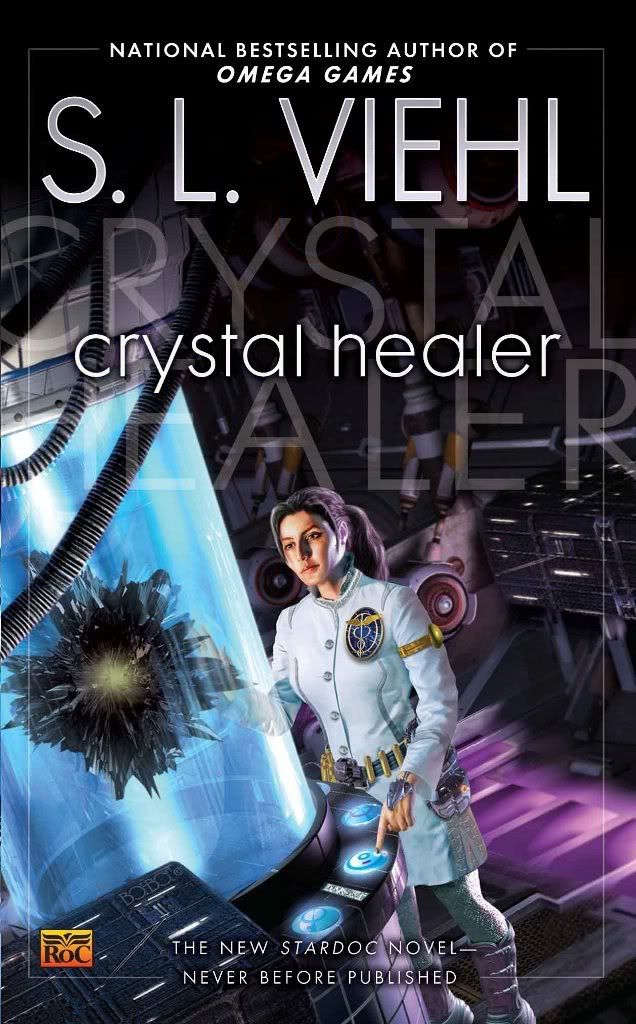 As of last weekend, my ninth StarDoc novel, Crystal Healer, is out on the shelves at all of the chain booksellers. Readers have also confirmed that it's been shipped from B&N.com, so if you were waiting until the official August release date there's really no need to anymore.
As of last weekend, my ninth StarDoc novel, Crystal Healer, is out on the shelves at all of the chain booksellers. Readers have also confirmed that it's been shipped from B&N.com, so if you were waiting until the official August release date there's really no need to anymore.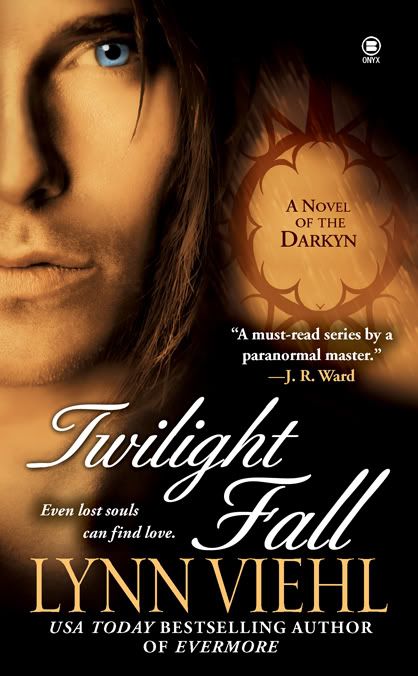 The folks at Berkley/NAL/Perigee Publicity for Penguin Group (USA) as well as my editor told me to put an announcement on my web site about a new e-book version of Twilight Fall that is being sold over in the UK by Waterstone; the sales page for it is here.
The folks at Berkley/NAL/Perigee Publicity for Penguin Group (USA) as well as my editor told me to put an announcement on my web site about a new e-book version of Twilight Fall that is being sold over in the UK by Waterstone; the sales page for it is here. 
